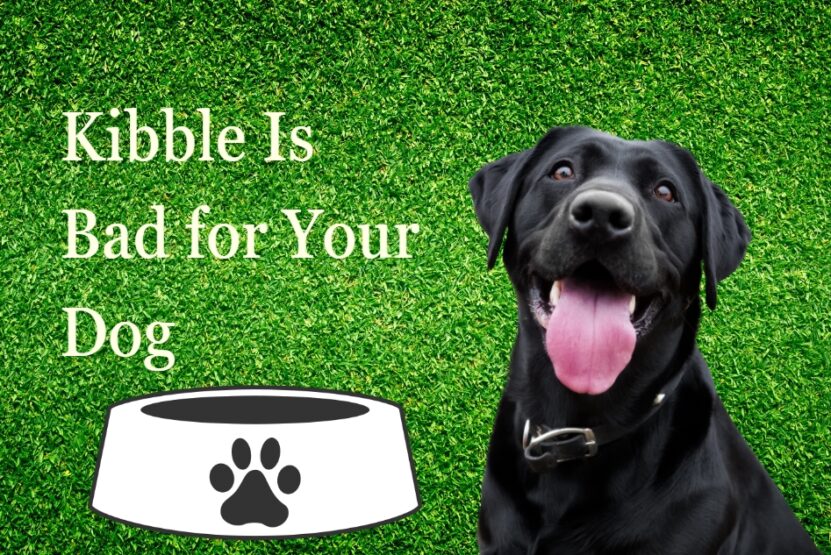Kibble, the seemingly convenient and staple diet for our furry friends, has been under scrutiny lately. For many dog owners, kibble has been the go-to option due to its affordability, long shelf life, and claimed nutritional benefits. However, a deeper dive into its components reveals some unappetizing truths that may make you reconsider your pet’s diet.
Nutritional Deficiencies

Kibble is often touted for its balanced nutrition, but is it truly providing all the essential nutrients our dogs need?
Lack of Essential Nutrients
Processed kibble often loses many essential nutrients during the cooking process. Vitamins, minerals, and proteins can be destroyed or altered, diminishing their nutritional value and bioavailability.
- Proteins and Amino Acids: Many kibbles contain an inadequate amount of high-quality proteins and essential amino acids, which are crucial for muscle development and maintenance and overall health.
- Fatty Acids: Essential fatty acids, vital for skin, coat, and cognitive function, are often present in insufficient amounts or deteriorate over time due to the prolonged shelf life of kibble.
Commercial kibble typically compensates for these losses by adding synthetic vitamins and minerals. However, these may not be as easily absorbed by the body as the natural ones, potentially leading to nutritional deficiencies and related health issues in the long run.
Poor Quality Ingredients
Kibble manufacturing often includes lower-quality ingredients, such as meat by-products, fillers, and artificial additives, to reduce production costs.
- Meat By-products: These are the parts of the animal deemed unfit for human consumption, often lacking in essential nutrients.
- Fillers: Ingredients like corn, wheat, and soy are used to bulk up the product but offer little nutritional value.
- Artificial Additives: Preservatives, colorings, and flavorings can cause allergies and other adverse reactions in some dogs.
Such ingredients can lead to obesity, digestive issues, and other health problems in dogs, especially when consumed as the primary diet over extended periods.
Health Risks

The impact of kibble on dogs is not limited to nutritional deficiencies but extends to serious health risks as well.
Dental Issues
Contrary to popular belief, kibble does not promote dental health in dogs. Most kibbles are high in carbohydrates, which convert to sugars, leading to plaque formation and, ultimately, dental diseases.
- Tartar and Plaque: The sugars from the carbs stick to the teeth, creating a breeding ground for bacteria, causing tartar and plaque buildup.
- Gum Disease: Prolonged exposure to sugars and bacteria leads to inflammation of the gums, resulting in pain and tooth loss.
To maintain proper dental health, dogs need a diet that mimics their natural eating habits, involving tearing, chewing, and crushing bones, which naturally clean the teeth.
Obesity and Diabetes
The excessive amounts of carbohydrates found in most commercial kibbles can also lead to obesity and diabetes in dogs.
- High Glycemic Index: Ingredients like corn and wheat cause a rapid increase in blood sugar levels.
- Overeating: The lack of satiety due to low protein and high carb content can make dogs eat more than necessary, leading to weight gain.
These conditions not only reduce the quality of life for dogs but can also lead to more severe health problems and shorten their lifespan.
Better Alternatives

Given the downsides of kibble, many dog owners are exploring healthier alternatives, focusing on natural, whole-food-based diets.
Raw Diet
A raw diet consisting of uncooked meats, bones, fruits, and vegetables is one alternative that is gaining popularity.
- Nutrient-Rich: Raw diets are high in essential nutrients that are preserved in their natural state, eliminating the need for synthetic additives.
- Dental Benefits: Chewing raw bones naturally cleans the teeth, preventing plaque and tartar buildup.
However, a raw diet requires careful planning and knowledge to ensure it is balanced and safe, reducing the risks of bacterial contamination and nutrient imbalances.
High-Quality Commercial Foods
For those who prefer the convenience of prepared foods, high-quality, minimally processed commercial foods are available, focusing on whole food ingredients and balanced nutrition.
- Natural Ingredients: These foods prioritize high-quality proteins, healthy fats, and nutritious carbohydrates without the use of fillers or by-products.
- Preservative-Free: Many of these foods are free of artificial preservatives, colors, and flavors, minimizing the risk of allergies and adverse reactions.
When selecting commercial foods, scrutinize the ingredient list and choose products with transparent, wholesome ingredients to ensure optimum health for your furry companion.
Ethical Considerations and Sustainability
Choosing the right food for your dog is not just about health; it also involves considering the ethical and environmental impact of the products we buy.
Ethical Animal Treatment
Many commercial kibbles are produced using meat from factory farms, where animals are often raised in inhumane conditions.
- Factory Farming Issues: Overcrowding, poor living conditions, and unethical treatment are common issues in factory farming, raising serious animal welfare concerns.
- Sustainable Choices: Opting for brands that prioritize ethical treatment of animals and use sustainably sourced ingredients can make a difference.
By selecting products that value animal welfare, consumers can contribute to a more humane and ethical food system for all creatures.
Environmental Impact
The production of dog food, particularly kibble, can have substantial environmental consequences, mainly due to the extensive use of resources and the generation of waste.
- Resource Usage: Producing kibble requires significant amounts of water, land, and energy, contributing to environmental degradation.
- Waste Production: The packaging and by-products of kibble manufacturing contribute to pollution and waste accumulation.
Choosing dog food brands that prioritize sustainability and employ eco-friendly practices can help mitigate the environmental impact of our pet’s diet.
Holistic Approach to Dog Well-being

The well-being of our dogs is multifaceted and goes beyond their dietary needs. Adopting a holistic approach ensures overall health and happiness for our furry companions.
Regular Exercise and Mental Stimulation
A balanced diet must be complemented with regular exercise and mental stimulation to keep dogs physically fit and mentally sharp.
- Physical Activity: Regular walks, playtime, and other forms of exercise are essential for maintaining a healthy weight and preventing obesity-related diseases.
- Mental Engagement: Interactive toys, training, and enrichment activities are crucial for keeping our dogs’ minds active and reducing stress and anxiety.
Implementing these elements into your dog’s routine enhances their quality of life and fosters a strong bond between pet and owner.
Veterinary Care and Preventive Measures
Regular veterinary check-ups and preventive measures are integral components of a holistic approach to dog well-being.
- Regular Check-ups: Regular veterinary visits help in early detection and treatment of potential health issues, ensuring a longer, healthier life for your dog.
- Vaccinations and Parasite Control: Keeping up with vaccinations and parasite control is vital for preventing serious diseases and infections.
With regular veterinary care, a balanced diet, and a loving environment, dogs can lead a fulfilled and joyful life.
FAQs
Is kibble more affordable than other dog food options, and is it a driving factor for its popularity?
Yes, kibble is generally more affordable and has a longer shelf life compared to fresh, raw, or high-quality canned food, making it a convenient choice for many pet owners.
However, the long-term health complications arising from a poor diet might lead to higher veterinary bills and reduced quality of life for the dog, negating the initial savings.
Can a balanced and healthy diet eliminate the need for supplements in dogs?
Ideally, a well-balanced and nutritious diet should provide all the essential nutrients a dog needs. However, some dogs, due to their unique health conditions, age, or dietary restrictions, might still require supplements to meet their nutritional needs.
Consulting with a veterinarian is crucial to determine the dietary needs and whether supplements are necessary for your dog.
Is it safe to prepare homemade dog food, and can it meet the nutritional needs of my dog?
Preparing homemade dog food can be a healthy alternative to commercial dog food, provided it is well-balanced, nutritionally complete, and prepared hygienically.
Consulting with a veterinarian or a pet nutritionist is essential when opting for homemade food to ensure that the diet meets the specific needs of your dog and to avoid nutritional imbalances or deficiencies.
Does feeding kibble increase the risk of my dog developing allergies?
Yes, kibble can increase the risk of food allergies in dogs due to the inclusion of various artificial additives, preservatives, and low-quality ingredients, such as fillers and by-products. Switching to a diet that includes natural, wholesome ingredients can help alleviate allergy symptoms and improve overall health.
How can I transition my dog from kibble to a healthier diet without causing digestive issues?
Transitioning to a new diet should be done gradually to avoid upsetting your dog’s stomach. Start by mixing a small amount of the new food with their current kibble, gradually increasing the proportion of the new food while decreasing the amount of kibble over 7-10 days.
Monitor your dog for any signs of digestive discomfort, and consult your veterinarian if any issues arise.
Can dogs be vegetarian, and is it a healthy option as opposed to kibble?
Dogs are omnivores and can survive on a well-balanced vegetarian diet, but it can be challenging to meet their nutritional needs without animal proteins.
If considering a vegetarian diet for ethical or health reasons, it is crucial to consult with a veterinarian or a pet nutritionist to formulate a diet that meets all the nutritional requirements to maintain optimal health and well-being of the dog.
Final Words
The revelations about kibble should prompt dog owners to be more discerning about their pet’s diet. While kibble may seem convenient and economical, the hidden costs to our pets’ health are far too great. By choosing more natural, nutrient-rich diets, we can provide our furry friends with the health and longevity they deserve.
Remember, every dog is unique, and dietary needs may vary, so consult with your veterinarian before making significant changes to your dog’s diet. And, of course, shower them with love, exercise, and regular checkups to keep them happy and healthy!
